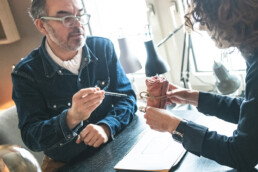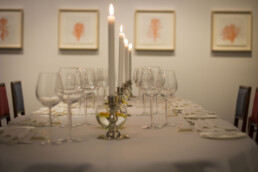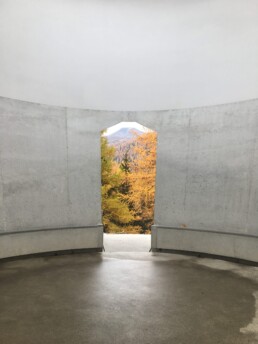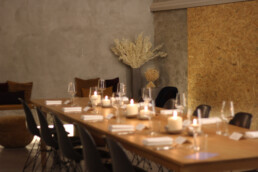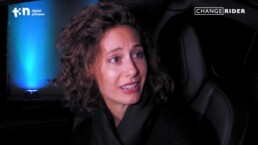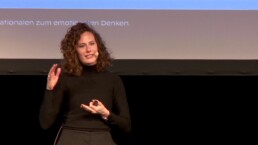Column: #1 Disruption
Disruption - How can we satisfy our customer needs?
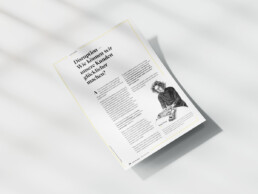
As a columnist Tanja Schug writes articles for the Zukunftsbeweger magazine on a regular base. The magazine is a wonderful product of Globalance Bank for their customers and partners.
Article: Die Welt - The Genuine is the new luxury
"The meaning of work is about to change."Work is now no longer the most important value by which individuals define themselves, says author and CEO Tanja Schug. She observes how a "totalitarian system" is beginning to crumble.
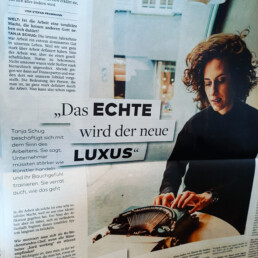
Tanja Schug is exploring the meaning of work. She says entrepreneurs need to act more like artists and train their gut feeling. She also reveals how this can be done.
A conversation with ...
“It is always about atmosphere."
— Yusuf Sert
The Tour of Inspiration Idea
The Tour of Inspiration is a walk combined with curated experiences. This tour is intended to open up one's perspective and, by setting curated impulses, to strengthen strategic business decisions and promote personal development. A physical tour guarantees the best results, however impulses can also be shared throughout a conversation within the Zero Senses Method as a companion. What is valuable is the active exchange that arises during this tour, which includes encounters with artists (broadly defined) and their stories. In the following interview with Yusuf Sert, an interior designer from Zurich, you will gain insights about what such an impulse can look like. Translating the newly gained insights into one's own business life is the artisan work, while Zero Senses offers a methodology.
A Conversation with Yusuf Sert - Interior Atelier, Zurich
Yusuf, tell us, how did this beautiful interior design atelier in the middle of Zurich's old town come into being? I took over this atelier four years ago. After almost a lifetime as an employee, that was when I decided to become an entrepreneur.
Would you mind sharing a bit more about your story? I have to go back a little further here... When I was very young, my father was convinced that the future would be about electronics. He was not completely wrong, because we are talking about the 90s, when we were experiencing the rise of technology companies and computers, like Apple with its Macintosh, etc. I followed the advice of my dad, but even while I was still an electrical engineer, I knew it wasn’t for me. On construction sites, I was fascinated by the plans instead of concentrating on electronics and my master’s degree. Something creative, working in design – that was what I wanted to do. So my next step brought me to lighting design.
How did you get from there to the showroom of a luxury furniture store? The creative side was always deeply rooted within me. Everything that had to do with interior design caught my interest. At the age of 16, I was already building my own lighting fixtures. Everything in my room I’d built myself. So I tried to get into the furniture and interior design business, but they weren’t interested in me and as I wasn’t admitted to the vocational school, I had to find another way to pursue my quest.
What was it like for you to know where you wanted to go, but to feel that the "normal" way was a dead end? I knew I had to get there somehow. I applied to a certain furniture store over and over again, but was rejected again and again due to my lack of experience. One day I discovered an advertisement from one of the furniture stores in Zurich. The unconventional boss – an American – invited me to an interview along with eight other applicants. Miraculously, a short time later I was hired, and that was how I got into the industry.
So you started working in one of the top furniture stores in Zurich without any experience. How did that go? I've never learned so much in my life. There are various things that contribute to how something comes about – I call it fate. In this case, I was alone in the furniture store after three months: everyone had quit. This was certainly the beginning of the end for the store, but for me it was probably the beginning of my most intense phase of learning. The furniture industry is a small one, and suddenly I was in direct contact with all the important actors in it, some of whom became contacts that have remained with me to this day. And in the end, I had the opportunity to follow through the entire liquidation process of the company. I can tell you how this kind of sale has to work. While liquidation is a field of its own, I can still apply this knowledge today. From then on I was firmly anchored in the industry.
What happened then? I used my network to find a new job. From that point on, I never applied for a job again. I gained self-confidence and learned to apply my knowledge in new situations, sometimes without being asked. My new employer was about to create a new lighting concept, and I was of course able to bring in my experience in lighting design. I "worked my way up" relatively quickly, and stayed with this shop for 13 years.
In the midst of all this success, how did you get the urge to do something of your own? I was living a double life. Whenever I went to furniture fairs, I shopped for the store, but also for myself in my mind. I kept a mental file of the pieces I would have liked to buy for myself, albeit still at the imaginary level. I knew that at some point in my life I would have my own shop. I always carried this idea in me.
Now here we are, sitting in your shop. What was the path that led you from your dream job back then to becoming an entrepreneur? The furniture business is a small world – I knew where I wanted to go and where I didn't want to go. For me, still today, it’s very important to know what you don’t want. And I’d peaked within the industry. There was nothing new that interested me anymore. I’d reached a turning point.
One day, the owner of the shop that we’re sitting in today called me and asked if we could meet. He came right out and asked me if I want to buy his shop, and we wrote the contract straight away on a napkin. There were of course other interested parties, but he seemed to have the best connection with me. He was about to retire, and I offered him the opportunity to keep a desk in the shop as long as he wanted.
How did it feel to suddenly have your own shop? I was a new person. I’m an entrepreneur, not a manager.
What is the difference in thinking like an entrepreneur and like a manager? I once said to a manager, "You always make me feel like I'm doing everything wrong." Managers have to be guided by facts. Everything needs a report, every decision has to be justified, preferably with market analyses, while feelings are completely irrelevant in the decision making process. That's not how I work.
An entrepreneur is not only concerned with the best margin. I can't just buy the top selling stock. I have to pick things that suit me. What fits my DNA? What doesn’t? Are there things that make me wince a bit when I order them? This is the exciting part. We have to show the customer what they might want. This can mean going a bit outside the DNA in order to be one step ahead, but always keeping the spirit of the times in mind. That's our job.
And how do you "manage" today? Everything goes a hundred times faster. For example, when I buy something new, I’m never sure if the product will work. I can make spontaneous decisions; I might decide while I’m unpacking it whether to keep it or use it differently than originally planned. My work is all about split-second decisions based on gut feelings – not on major market analyses.
Is using this gut feeling something that can be learned? Yes, you have to learn to choose from your gut and decide from your head. It’s a combination.
Where do you get your inspiration from? It's the combination that matters, that's very important. German, Italian, French and English magazines have always been a source of inspiration for me. But not only that: I always ask my friends to bring home magazines when they go on holiday. Each country has a different approach or mentality. You can even see the difference between the French-speaking part of Switzerland and how we do things here in Zurich. And I put a lot of thought into the issue of beauty. What does aesthetics mean, what’s behind a customer’s "I like it" or "I don't like it"? Also, I’m a bit of fan of Oliver Jan and AD Germany.
Is there a person who has particularly shaped or inspired you? There are many. In general, I've noticed the greater of an expert someone is, the less likely they will say, "this isn’t possible". Confident “amateurs” are the ones who judge immediately. But true experts allow for a diversity of approaches. They’re open to other perspectives and give them a chance. This is how good concepts are created. I think that almost nothing is ugly. Our task is to create the right context.
Just to illustrate that, here’s an example: In our industry, 85% find minimalist tables with thin legs aesthetically appealing, but in America, only 1% of people would say that’s beautiful. The world is so different, and our design world is so small. We have to be open and listen to what the customer wants. In Mexico, our atelier would look like the entrance to a prison, because there the driving aesthetic is opulence, not simplicity.
Does your inspiration fit into any geographical categories? The Italians were the first to conquer the design market, but the "new" Scandinavians offer incredible spectacular works. They're a bit ruthless, but they do strike a chord. Otherwise I look to Switzerland for precise design, to England for anything with a Heritage resonance and to France for a Bohemian touch.
Where is the design market heading? Towards a warm minimalism.
Have you ever regretted any step you made? My father was right, all my colleagues from back then have made careers in technology companies. But I have to tell you, I've never felt better: I feel young and completely in my element.
About
Yusuf Sert, interior and lighting designer, has his studio on Oberdorfstrasse in Zurich. He is known for the unique atmospheres that he creates for his private and corporate clients, using his own designs and those of prominent manufacturers.
Share
Podcast: Heidi Hauer with Tanja Schug
Intuition as a success factor for management issues.
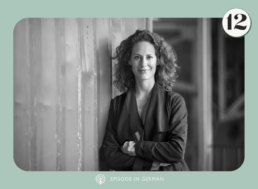
Listen to the podcast interview
Episode #12
Tanja Schug explains why it is important to learn to verbalize intuition, why intuition cannot simply be switched on and off like logic, but needs impulses. Rationality paired with gut feeling leads to more clarity, security and independence in decision-making processes.
Circle of Inspiration: A Dinner in the Gallery
About the Circle of Inspiration
The Circle of Inspiration, a salon-like event that focuses on good conversations within inspiring venues, took place in February in St.Moritz. A unique visual and culinary tour curated by Zero Senses, it led guests through the three floors of the Hauser & Wirth Gallery and featured inspiring thoughts by the director of the gallery, Stefano Rabolli Pansera, about the “art of creating context”.
A review written by Tanja Schug
How to Curate a Good Conversation?
Let’s be honest: one rarely gets inspired at conferences or even at regular business meetings: these occasions are often mere repetitions of what is already known. I have mostly found inspiration through serendipitous one-on-one conversations with people from outside my professional field. Such meaningful encounters bring new insights. However, good conversations seem to be a rarity nowadays, and when we do chance upon one, it is most likely outside of crowded conference halls.
Is it possible to create an event that is designed to make meaningful conversations happen? I was intrigued by the thought of translating my inspiring moments into a format in which I can share this experience with others. The Circle of Inspiration is a private event, where an intimate group of carefully chosen guests from different fields dive into a given topic and open each other’s perceptions by sharing their perspectives. The Circle always takes place in a unique and inspiring atmosphere that is relevant to the theme of the evening.
The aim of the Circle of Inspiration is to expand existing thought patterns and open up new mind space. Sounds abstract? Ultimately, it is about having a good conversation in an environment that fosters meaningful exchanges.
The Art of Creating Context
The Hauser & Wirth Gallery is one of the world’s best known and highly regarded art galleries. Its director, Stefano Rabolli Pansera, an architect by profession, presented the gallery’s current Charles Gaines exhibition to the guests. As an architect, his strength is certainly not only that he understands the fundamental idea of creation, but also has the skill of creating an impactful and fascinating context around any (art) piece he speaks about. Stefano shared his insights about the much admired (for some, overrated) and yet magical art world:
“The art world is an extraordinary ecosystem, where all actors must play an active role: artists, collectors, galleries, institutions, curators, journalists, and teachers. Art galleries can be interpreted as agents to trigger, construct, enhance and nurture contexts for their artists as well as for their collectors. Art galleries contribute to the creation of a cultural context for artists, revealing the wider cultural horizon where their work is conceived and produced. Art galleries construct an audience of possible collectors enriching the market (the commercial context) for its artists.”
“The art world is an extraordinary ecosystem, where all actors must play an active role: artists, collectors, galleries, institutions, curators, journalists, and teachers. Art galleries can be interpreted as agents to trigger, construct, enhance and nurture contexts for their artists as well as for their collectors. Art galleries contribute to the creation of a cultural context for artists, revealing the wider cultural horizon where their work is conceived and produced. Art galleries construct an audience of possible collectors enriching the market (the commercial context) for its artists.”
— Stefano Rabolli Pansera
Bringing back the Magic
For me, the art of creating a context is connected with the need to add a touch of magic to a grey, dull and crowded world. Due to constant availability and connectivity, people have unlearned how to be “enchanted”. We no longer know what it means to wait for something. From one-click buttons to social media and messages, everything is instant. But where is the magic? What triggers our curiosity? And what draws us under its spell? When you ask yourself what enchanted you last time, you will probably have to go back to your childhood. Maybe you remember how your mother or father once told you a fairytale. Most of us remember these simple but magical moments of excitement and suspense when listening to a fairytale which promised a happy end. These are the moments that we need to re-create. I am convinced that if we create magical moments in everything we do, we bring back attraction, curiosity, imagination, and beauty to everyday situations, including business. The art world is a wonderful example of this.
Connecting two Worlds
Zero Senses is deeply connected with arts, as the name of the company, which refers to the post-war ZERO art movement, already expresses. Zero Senses also resonates with the process of artistic creation in the way it helps its clients find inspiration.
The fact that I curate individual Tours of Inspiration for my clients is ultimately a transposition of what an art curator does for galleries, making the Hauser & Wirth Gallery an ideal venue that also embodies the meaning of curated inspiration.
Curating a physical and mental mind space for serendipity and good conversations is what the Circle of Inspiration aims to do. Thank you, Stefano Rabolli Pansera for having given us great insights into the art world!
Share
The Era Of Artists
Profession: Job Title
Imagine you are invited to a dinner party with lots of people you have never met before. As you enter the room, the host introduces you to a group of strangers. It is a moment when most of us hold our breaths: what will he say? How will he introduce me? Usually we are introduced with our job title and the name of the company we work for. But what does that really say about us?
Our social status is largely connected to our profession. If Angela Merkel loses the position of the most powerful woman in Germany, what will remain? We can ask the same question when the CEO of a major bank resigns. Again, what remains from the prestige of the position? One thing is certain: the number of invitations that people receive will drastically fall as soon as they leave their role and suddenly become “less important” in the eyes of society.
Defining who you are based on values, talents and passion is certainly not an easy task, yet it is the most sustainable of all ways: no one can ever take such a “title”, which purely expresses who you are, away from you. Letting go of the superficial shell of a job title requires courage and confidence: by leaving, it may seem that we cut off a part of our identity. Yet in reality, true identity cannot be determined by social status. Its source is inside us.
There are two ways of gaining recognition: either by following a predetermined path, shared by others; or by introducing and applying a new discipline. For example: a marathon runner who aims for a new course record will be appreciated only as long as he or she holds the record, but those who introduce a completely new discipline might set a lasting impression.
A Character is Born
The word character originates from the ancient Greek expression kharakter (= engraving), which means “engraved mark”. The initial meaning gave rise to the definition “distinguishing qualities”. When it comes to people, the ones with character are fascinating even in their imperfections. Their beliefs and distinct features - what I refer to as “edges” - shape their lives in an authentic way. The key to achieving this state of mind is a conscious self-awareness that helps manifest one’s characteristics.
Developing character is not something that can be faked. Authenticity requires continuous and hard work: it takes a lot of time to develop the “edges”. Pablo Picasso started his painting career with realistic portraits at the age of 15. Over the years, however, he developed his own style, gradually opening a new dimension of art (Cubism) in his early 30s. On our character journey, self-realization becomes the prime objective, regardless of expectations (like deriving one’s identity from a job title). The yes’es and no’s of an authentic life stem from clarity; which fuels the filtering of opportunities, decisions, people, concepts, and ideas. Therefore, clarity gives focus. Furthermore, a character does not show arrogance - it would be a contradiction, a person simply is who he or she is.
Beyond Competition
Have you ever asked yourself why so many friends (or even yourself) want to run a marathon at least once? If we are very honest, of course, a sprinkle of competitiveness always accompanies our decision to sign up for a race. It would only be fair if we asked ourselves: “Why do I need to show that I am ‘better’ than others?” The answer is probably linked to our need to belong and to find a role in a certain context, expressed through a status in the top ranks.
People with true character do not care about the racetracks of societal expectations, they create their own context instead - even if it is considered irrelevant or ridiculous by society. Today most people who are regarded as “successful” have no character, but are merely smart enough to play well within the system. However, since titles no longer bring satisfaction, my conviction is that we are entering an era in which developing character will be as “normal” as studying to be a lawyer or financier is today. The quest for meaning in a world where everything is instantly accessible is increasingly gaining importance. I see a craving for meaning beyond knowledge and for true differentiation based on quality. A job title is not enough anymore.
Substantive change never originates from the masses: overconsumption, instant access to goods and services globally, and the banality of infinite freedom creates a sense of emptiness in the soul, as one realizes that what appeared to be part of one’s identity was just a piece of rented-out and meaningless decoration. As the shell starts to crumble, we realize that the true context lies within ourselves. The era of artists arises.
How to Become a Character?
It does not matter whether we want to learn a new language, become more athletic, or run a successful business: strict focus and consequently developing a routine is essential for success. As an experienced yoga teacher once told me: awareness, development, proficiency and mastery - this is the due course of every discipline.
Zero Senses helps you become aware of your values, develop a conscious understanding of your vision and wants, and embrace all this in confident decision making. As we consistently practice this course, mastery will follow.
Like a catalyst, we condense your essence. What remains is your characteristics expressed in words and a clear picture. A conscious awareness of your character guarantees more clarity expressed through independent decisions, as well as for being seen for who you are.
image source: https://www.wikiart.org/en/pablo-picasso
Share
Circle of Inspiration: A Perfect Match
It was something different - intimate and refined in a very special location”
— Quote from a guest
How is the Circle different from a normal dinner invitation?
A selected group of leaders and artists from various fields were invited to enjoy the salon-like atmosphere of a surprising location: the private atelier of a young, yet well-known Zurich chef, where the guests experienced an inspiring dinner with a special “sensory highlight”.
The Circle of Inspiration takes place in a private environment that I carefully curate for that night. Curation means that we create a unique experience that sharpens sensory awareness by consciously choosing even the minutest detail. On the last occasion, we took the guests on a carefully-prepared taste journey: my great partners in culinary experiences, Patrick Schindler and Luca Tribò helped me with the curation, from perfectly harmonizing the menu with the wine selection to creating the general atmosphere.
“It was a journey to paradise - to your paradise of spirituality and intellectual power”
— Quote from a guest
However, curation extends beyond refining the details of the dinner. Invitations to the Circle are carefully considered: personal connections can only flourish between people who match in personal qualities and interests. Guests are chosen carefully, based on their background and personality (beyond job titles), creating a fertile ground for fruitful discussions and meaningful relationships. Therefore, an invitation means that guests can trust that they will have an enriching experience.
The Circle of Inspiration is a framework in which inspiring conversations can flourish and the members can receive impulses instantly. On the occasion of the one-year anniversary of Zero Senses, I illustrated with a recent example how my approach of curated inspiration works in practice. However, I only provide the framework. The real impulses are given by everyone else who is part of the Circle.
“It should become natural: to stimulate our senses for changing the world”
— Quote from a guest
Essentially, the idea behind the format is rooted in the everlasting need to find the right source of inspiration: I create an atmosphere where inspiration can flow in abundance. The Circle is a condensed version of what I offer in the Zero Senses Retreat ‘Cultivating Presence’, where only a hand full of natural leaders will come together from various fields to receive inspiring impulses.
Share
Video: Tanja Schug about "A New Currency - Intuition"
As a co-driver in the ChangeRider Tanja was asked how a conscious intuition can have a positive influence on business and what that has to do with inspiration and new different viewpoints.

Watch the Change Rider Interview
Episode #36
The ChangeRider special edition during the Gen*ZEO Award show in Berlin, Philipp Depiereux talks with Tanja Schug about intuition as currency.
Video: Tanja Schug about "Cultivating Intuition"
Tanja Schug was sharing her thoughts on the role of intuition in business decisions.
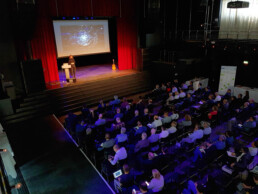
Watch the video about how to cultivate intuition for more clarity in business decisions.
Intuition is neither an random feeling nor a sixth sense, but a form of intelligence that we have paid little attention to in recent years.
How the potential of our intuition can be re-activated Tanja Schug speaks about in this teaser of her speech about "Cultivating Intuition".
